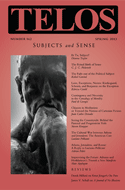Rahul Govind’s “The Fade-out of the Political Subject: From Locke to Mill” appears in Telos 162 (Spring 2013). Read the full version online at the Telos Online website, or purchase a print copy of the issue in our store.
 The following essay takes as its conceptual core an investigation into the relation between time and political subjectivity, which is undertaken through a reading of John Locke and John Stuart Mill. The latter’s theorization of liberty and progress is contrasted to the former’s understanding of the political subject via an eschato-theological understanding of time. Ultimately Mill’s position—as a “stand-in” for modernity—will be found to be unjustifiable in its uncritical distinguishing between time and the (political) subject, thereby laying the groundwork for what is perhaps the dominant paradigm of political philosophy today: political not metaphysical. A subplot in the essay argues that Mill’s well-known endorsement of British imperialism can be traced to these problems besetting the theoretical relations between political liberty, time, and notions of progress. Through a constructive reading of Mill (finding echoes and cross-stitching the System of Logic and his political writings) and Locke (finding echoes and cross-stitching the Treatises and Reasonableness of Christianity), we hope to revisit the problem of the political subject though time. In the light of this, the conclusion engages the work of Foucault and Koselleck as they “overlap” in an evaluation of modernity in its temporal articulation.
The following essay takes as its conceptual core an investigation into the relation between time and political subjectivity, which is undertaken through a reading of John Locke and John Stuart Mill. The latter’s theorization of liberty and progress is contrasted to the former’s understanding of the political subject via an eschato-theological understanding of time. Ultimately Mill’s position—as a “stand-in” for modernity—will be found to be unjustifiable in its uncritical distinguishing between time and the (political) subject, thereby laying the groundwork for what is perhaps the dominant paradigm of political philosophy today: political not metaphysical. A subplot in the essay argues that Mill’s well-known endorsement of British imperialism can be traced to these problems besetting the theoretical relations between political liberty, time, and notions of progress. Through a constructive reading of Mill (finding echoes and cross-stitching the System of Logic and his political writings) and Locke (finding echoes and cross-stitching the Treatises and Reasonableness of Christianity), we hope to revisit the problem of the political subject though time. In the light of this, the conclusion engages the work of Foucault and Koselleck as they “overlap” in an evaluation of modernity in its temporal articulation.








